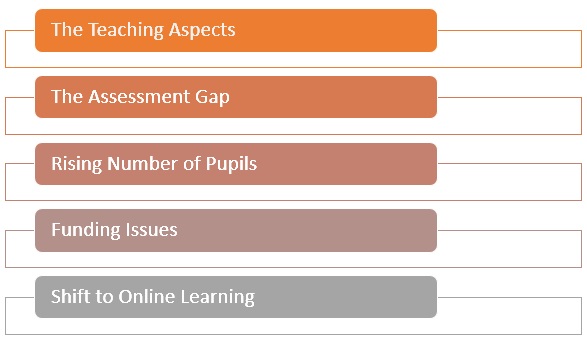When we think of school leadership, we tend to think about school principals and supervisors who are responsible for monitoring the operations of their respective institutes, managing the curriculum and syllabus, guiding their wide range of students, communicating with the parents and authorities, and a slew of other responsibilities that are embedded into their roles. Put simply, school leadership is a very taxing job, and there are numerous challenges faced by these leaders. That said, the need for school leadership and management courses have escalated in order for school leaders and managers to deal with these challenges and excel in their roles. Some of the prime challenges observed by school leaders and managers have been outlined below.

- The Teaching Aspects: When reading theories and frameworks designed by renowned scholars, we often come across a variety of collaborative teaching styles that endorse facilitation. Moreover, researchers tend to emphasise the need to identify the learners’ preferences and design lesson plans that cater to the divergent learning needs. Likewise, teamwork, discussion based learning, and hands-on activities are positioned under the limelight. Despite these, when it comes to actually teaching in a classroom, teachers end up resorting to traditional, instructor-led sessions as the focus shifts to completing the syllabus, and ensuring high grades, instead of promoting sustainable learning. On that note, school leaders need to not only train their teachers to apply certain methods, but they also need to check that the modern teaching frameworks are actually being practiced.
- The Assessment Gap: Similar to the gap in our perception of effective teaching and teaching that is actually performed, there is a similar gap prevailing in the assessment element of schools and other educational institutions. For instance, research has revealed the essence of communication skills, teamwork, coordination, creativity, and problem solving as some of the cardinal skills that must be assessed. Nevertheless, the extent to which schools actually perform assessments to evaluate these criteria are limited as the traditional focus on grades and scores is still too prominent.
- Rising Number of Pupils: A rise in average income levels and surging affordability amidst the middle-class consumers in developing nations have meant that more parents are being able to send their kids to school. Add this up with the fact that the population of south east Asian countries are on the rise, and you will end up with a magnifying number of pupils willing to receive education. Needless to say, the burden of this largely lies upon school leaders and managers as they have to manage schools with more students emerging from variant backgrounds and learning requirements. Furthermore, inclusivity has gained traction and inclusive education means that school leaders now have to manage a sea of pupils, some of them with special requirements. Such changes will demand modifications in the recruitment and training of teachers, the development of the curriculum, and so many other factors.
- Funding Issues: This has been a consistent concern that has disturbed school leaders, and it continues even up to this date. Especially in public schools, the flow of funds is highly restrained as delays and insufficient financial support makes it difficult for school leaders to seek the visions they have for their schools and students. It is worth noting that even though tax revenues are generally invested in education, the amounts offered is not always adequate.
- Shift to Online Learning: Due to the current coronavirus pandemic, a massive portion of our education has shifted to online/virtual platforms. This has opened up a spate of both opportunities and challenges, meaning that the school leaders need to now become technologically savvy, and look for ways to engage their students through online learning. This requires a lot of work as entire lesson plans need to be conditioned, teachers have to be retrained, and even the digital infrastructure needs to be redesigned. In fact, the school leadership and management courses are happening to place a great emphasis on online learning and how school leaders and managers can adapt to them.
While these are some of the key challenges facing school leaders, there are many more issues that school leaders will have to face. However, opting for meticulously planned school leadership and management courses can play a vital role in helping school leaders cater to these concerns. There is no one main solution for the challenges outlined above, which is why school leaders need to be prescient and flexible in these changing conditions.









